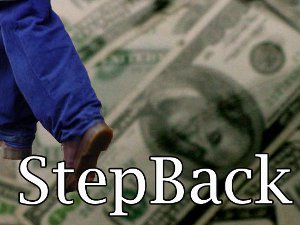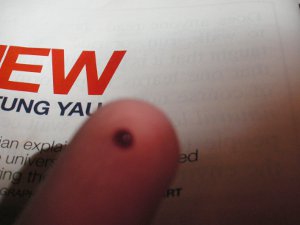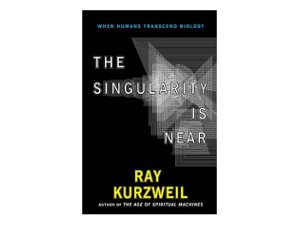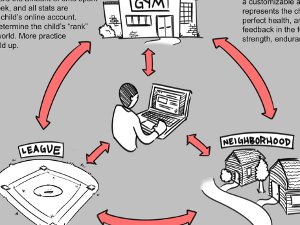 click for full image |
Safer Hospitals : : Learning from the Human BodyEnvision a hospital wing that learns from the human body's first line of defense: the innate immune system. It's much harder for bacteria to conquer new territory if it's already colonized. As outlandish as it seems, hospitals are among the worst places one can go to avoid picking up infections--so much so that there is a term dedicated to these occurrences (Nosocomial infections). The idea here is to inundate the air with good bacteria (natural to the human body) to out-compete the bad ones, making it difficult for pathogens to take root--preventing vulnerable patients from catching dangerous infections. by: Dave Gupta | Jun 22, 2010
|
 |
StepBackMonetize footsteps. Take the average cost to insure the public at weight X. Determine cost savings of reducing total per capita weight by X percent. Take 90 % of that and put into a trust. Then break down cost into individual steps and assign monetary value eg. $.00075 per step. Give individuals a smart pedometer that "phones" home. Mail them a check. Walk 25k steps get 7 buck Walk 50k steps get 14 bucks and so forth and so on. Fund through insurance companies, they pay $.90 to save a buck. by: ryan libson | Aug 4, 2010
|
 |
biomarkers with patient and expert crowdsourcingMake free the ability to get a 1000-panel blood test quarterly. Blood testing, DNA, physicals, etc. Sensors/chromatograph/chip reader machines will need the same kind of focus as DNA sequencers. Capture the data and publish in a public website that plots trends with comparisons. Allow individuals to review the data, read professional analysis results and blog their symptoms. Statisticians, scientists and engineers can aggregate and mine the data. Over time, real cause-and-effect will emerge. Continuos improvement in this whole feedback & analysis system, could help attain unknown hieghts of health mastery. So Bill, Melinda, Warren, ...we better hurry up! :-) by: Allen Brown | Jul 25, 2010
|
 |
Health Ways Unlimited CentersA 21st Century business model that brings health information to the store front sidewalks across America. These health information centers offer free health and wellness information and sell no physical products in the store. There are displays in the store that educate the customer about product or services. Computers in the store offer online resource information and options for purchasing directly from the vendors. There are free on going lectures and demonstrations to assist the customer in gaining health and wellness information. Click the image to learn more. by: Terry Mullenbach | Jul 24, 2010
|
 |
 The Recovery ProjectThe Recovery Project would organize people's personal narratives of recovery so that they can be best learned from by others. By letting patients see what others have done and by creating high-level meta-narratives, patients can see the decision trees that others have used, saving time in creating their own from scratch. Sharing and reading similar narratives provides an affective component to possibilities for personal health -- critical when conditions require changes of habit. And experts and practitioners will be able to contribute their stories of helping patients recover, integrating various medical professions' perspectives, instead of creating a divide. by: Michael Nagle | Aug 2, 2010
|
 |
Singularity Weight Loss CentersCreate an international chain of weight loss centers based on the precepts of singularity. People may choose to adopt a healthy lifestyle as Kurzweil’s vision of singularity becomes mainstream. Singularity posits that if people live to 2050, they might live forever given the exponential expansion of science and medicine. This creates a paradigm shift that may motive people to resist temptation. When facing a firing squad, it is hard to resist the sensual pleasure of a candy bar. The potential prospect of living forever, though, trumps momentary pleasure. The centers may expand into: Diagnostics, Exercise, Restaurants, Grocery, Retail, Food/Supplements, Entertainment by: Bruce Polatnick | Jul 28, 2010
|
 click for full image |
Inter Connected SportsImagine a system of gyms (with stat-tracking equipment and facilities), sport leagues (with tracking and recording), and social networking (based around health and exercise) that could encourage kids to exercise more and eat healthier though virtual and physical incentives. With the help of friendly peer pressure, accountability, online gaming, and rewards, we could renew the interest in sports that has fallen wayside to video games and online activity. Each child gets an online account, which is advanced through physical activity. The only way to level up is to go out and play! by: Timothy Hicks | Aug 10, 2010
|
Un-subsidizing Tobacco by Requiring Insurance30% of adult health care costs worldwide will soon go towards tobacco-caused diseases because of PAST tobacco use. A little regulation goes a long way: 1) To purchase tobacco, one must have "Smoking Insurance", just as skydivers need "diving insurance" before jumping out of a plane. Smoking insurance will be a rider providing, say $100,000, to cover ONLY tobacco-related health costs, like 99% of any emphysema treatments, 30% of stroke, etc. 2) sharing tobacco - like Vicodin - will not be allowed. Thus, the smoker (not the state) prepays for and is forced to confront the health-related costs of smoking! by: Bruce Chou | Aug 6, 2010
|
 |
Mirror Neuron System in Kindergarden Dining HallSome children have bad eating habits. We designed a digital projector software with a mirror neuron system to show funny cartoon figures in an eating story in kindergarten dining halls. Designing funny eating jokes involved with their figures activates memories in the mirror neuron system and persuades children to eat healthy, joyful food with corresponding funny objects. The system gives them virtual prizes and virtual gifts for their good habits by the cognitive vision measurement of similarity. Furthermore, we can design a mirron neuron system to make all eating happier and more conscious, not just in schools. by: Zhuang, Chao | Jul 27, 2010
|
 click for blog post |
WellbeingismWhat if we were not the only ones responsible for our health? What if our society structures would be preventing us from achieving complete health? In order to live a healthy life, in order to achieve wellbeing, shouldn't we start by looking at creating the "optimal" society? Welcome to the world of Wellbeingism. by: Cynthia Bouchard | Sep 1, 2010
|





